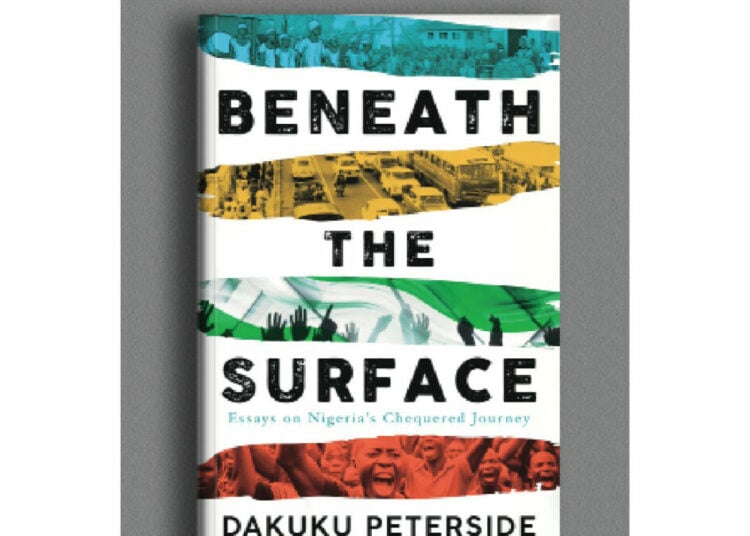A renowned Professor and former Dean of Arts at the University of Uyo, Professor Joseph A. Ushie, FANA, has lauded the book Beneath the Surface – Essays on Nigeria’s Chequered Journey by Dr Dakuku Peterside and provided a comprehensive review of it. In that review, he states,
Beneath the Surface – Essays on Nigeria’s Chequered Journey is a compendium of essays by Dr Dakuku Peterside, public policy expert , management turnaround professional and one of the finest and most regular contributors to mainstream Nigerian media on issues central to the development of the Nigerian State. Published in 2025 in Lagos, Nigeria, by Makere Publishers, the 70 essays, totalling 496 pages, are grouped into six parts. Given the vast kaleidoscope and depth of each of the 70 topical polemical essays, any attempt to go into the details of any one of the contributions in a preview such as this would be like an attempt to drain the waters of the Atlantic Ocean using a tablespoon. However, reviewing just the titles of the six sections of the book could yield a clear picture of the spectrum of issues covered by the entire book.
But before we delve into the contents of the book, it is necessary to make a tangential observation about the front cover, where the real story appears to be told through pictorial representation, aligning with the broad title of the book. There are four different pictures on the front cover arranged vertically, each of which signifies something unique about the country, Nigeria. The first picture on top of the page, with Nigeria’s Green-White-Green flag as background, depicts only palms waving somewhat triumphantly to the skies. Ostensibly, this represents Nigeria at its independence in 1960. The next photo is an orderly, sane, and serene-looking typical modern city, showing commuters and various kinds of vehicles. As we move to the following picture, we see young, vibrant-looking Nigerians of different ethnic and cultural backgrounds staring expectantly ahead, as if towards a future. Then, at the bottom of the front cover, or beneath all the other pictures, is a picture of angry, protesting Nigerians with their fists raised in defiance, showing despondency and maximum frustration. Thus, right on the front cover of the book, much of the story of its contents is revealed as dealing with a society that began with high hopes but has now been enveloped in shrouds of angst, despair, and despondency. In sum, therefore, the keen reader understands, just from the front cover of this work, that “beneath the Surface” of independence and its euphoria, beneath the early sprawling Nigerian cities that were the envy of the country’s contemporaries, beneath the hopes and aspirations of the comingling Nigerians, is hopelessness and wailings and endless protestations and anger.
This is the front cover that wraps the six sections of the compendium. Essays that fall into Part One are summed up under the title, “The People and the State of the Nation”. This section contains the highest number of 19 chapters, and the dominant themes of the author in the entire section are hunger and education. Indeed, hunger among Nigerians, for instance, is such a central concern to the author that he has christened a chapter in the work “Hunger Republic of Nigeria”, and another, “Hunger Is Real and Present”. Education, poor electricity supply, the exodus of youth to other lands under the popular “Japa” syndrome, (im)morality and the need to give women a chance to lead are other issues that enjoy prominence in this first part of the book. Part Two, titled“Governance and Leadership Issues” holds 13 essays, which largely x-ray what the author calls“Dark Chapter for the Judiciary”, questions if democracy has failed Nigerians, showcase the good example of Borno State’s Governor Zulum, and, again, bring into the orbit the gender-equality bills, among other topical issues of governance and leadership of the Nigerian State.
Essays specifically addressing“Elections, Politics and Power”constitute Part Three of the compendium, and there are 9 essays in this section. The contributions in this section bring to the surface matters related to the nation’s electoral system that have remained beneath the Surface for the ordinary Nigerian voter.Among the 9 chapters are “Crowd for Hire”, “Manifestoes that Will Not Manifest”, “Judicial Intervention as Extension of 2023 Elections”, “Unwritten Rules of the 2023 Elections” and “Security and the 2023 Campaigns”. Parts Three and Four of the volume share specific attributes. Part Four is christened “Crime, Violence and National Security”. Like Part Three, Part Four has 9 chapters, and the two sections seem to be the epicentre of the explosive character of the entire work. Part Four dwells on the stridently disturbing issues of terrorism, “ENDSARS and the Rise of a New Nigeria”, “The Scourge of Ritual Killings in Nigeria”, “Spread of Mob Justice in Nigeria”, “Plateau of Crises and Death”, in which “Plateau” equally serves as a synonym for peak or climax in addition to its reference to Nigeria’s Plateau State; and kidnappings.
In Part Five, Dr Dakuku Peterside’s attention is turned to “Economy and Development Interventions”. As with the previous Part Three and Part Four, the fifth section of the book comprises 9 chapters, all of which focus on matters relating to the economy and development. Samples of the essays here are “Rescuing the Nigerian Middle Class”, “Accountability Deficit and the Transparency Question”, “A Generation Ambushed by Drugs”, “The Deity Called Petrol”, “Surviving the Hard Times”, and “Two Global Wars and Our Economic Plight”. Anyone who has lived in Nigeria in the last two decades or so would have a sense of déjà vu on going through these titles, as they are the topical issues that have touched the lives of most Nigerians lately. Significantly, however, the author goes beyond the Surface to tackle the challenges isolated and proffers informed solutions which, if adopted and implemented, could reduce, if not totally solve, the nation’s intractable problems.
Since Nigeria is an integral part of the global community, whose actions, inactions, omissions, and commissions can impact the country negatively or positively, Dr Peterside’s pen has encompassed several global happenings, highlighting the implications of these overarching developments for Nigeria.Essays in this area have been constellated to form Part Six of the collection. Recent international developments find expression in the book under such topics as “Lessons from Chad”, “Niger: Trouble in the Neighbourhood”, “Secessionist Agitations in Nigeria and Israeli-Palestinian Conundrum”, “China’s Leadership Playbook and Nigeria’s Reality”, “From Nairobi to Nigeria: Kenya’s Election as a Mirror Election”, “Zelensky, Ukraine, and Lessons for Nigerian Leaders”.
In this collection of essays by Dr. Dakuku Peterside is, hence, a comprehensive historical map of Nigeria showing in both diachronic and synchronic terms the origins of the nation’s woes, its present dire social, economic and political quagmires, all drawn in palatable and mellifluous prose, but beneath which the author presents the path towards a rebirth and a revitalization of the polity. Put differently, this is an assemblage of nuggets of workable panaceas wrapped in one beautiful volume as an elixir for the nation’s troubles. Beyond the potential of the essays to heal the nation’s myriad wounds and the beauty of the author’s language, the thrusts of the contributions eloquently testify to the author’s keen knowledge of and total, passionate immersion in his country’s many challenges. To have a copy of this work, Beneath the Surface – Essays on Nigeria’s Chequered Journey is to have in one’s hands a complete history of the country, at least, covering the last three decades of our existence; and to read the book is to undertake a journey, not just backwards towards where the rain began to beat us, but also deep down, towards the taproots of our underdevelopment, and to where the solutions lie.
“One house owns the cock, but the village owns its voice”, so goes an African proverb. In line with this saying, Dr Dakuku Peterside is one cock owned by Nigeria, but the entire world owns his voice, mainly as very ably and loudly represented in this collection of essays. Naturally, therefore, some of the praises for this work have come from afar, where the echoes of this voice in the form of a book have reached. The first is the applause for the book as expressed by the Kenyan global intellectual, Professor P. L. O. Lumumba, who asserts: “This potpourri of well-researched essays will prick the readers…because the author has dealt masterfully with a multiplicity of socio-economic and political hurdles that have and continue to stand in Nigeria’s path to greatness”. The African Union High Representative for Silencing the Guns in Africa and former President of ECOWAS Commission, Mohamed Ibn Chambas, describes the book as “…A wide-ranging, thoughtful, thoroughly researched, erudite and enlightened discussion of contemporary Nigerian, African and Global issues”. In his own words, Bishop Matthew Kukah, Catholic Priest, maintains that “Dr. Dakuku Peterside has served us a salad plate of exquisite writing, flowing in prescient prose and narration, an in-depth kaleidoscope of exciting and alluring themes. The author has opened a window for future exploration of the options for a new Nigeria”. Among other eminent personalities and intellectuals who have praised the book are Dr Kayode Fayemi, Professor Emeritus Anya O. Anya and Professor Kyari Mohammed.
Here, then, is Dr Dakuku Peterside’s seminal work, Beneath the Surface – Essays on Nigeria’s Chequered Journey, as a rare gift from a rare brain baked by rare exposure to the rare oddities of our land. Just as it is often said, “Seeing is believing”, I say, reading this book is believing.
Joseph A. USHIE, is a professor of linguistics and former Dean of Arts, University of Uyo





